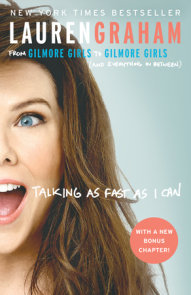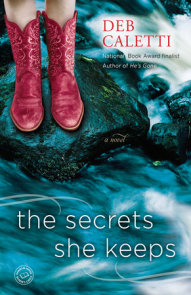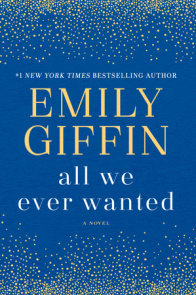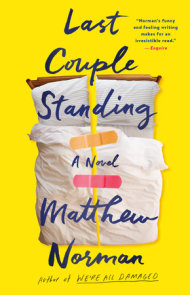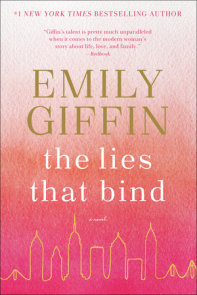READERS GUIDE
A Conversation between Lauren Graham and Mae Whitman
MAE WHITMAN is a child-turned-actor who hails from and currently resides in East Los Angeles with some dogs, a turtle, a cat, and a super cool roommate. You can find her acting on the shows Parenthood and Arrested Development or hear her speaking as the voices of Tinker bell and April O’Neill. She enjoys reading comic books, eating kale, sitting down outside and showing people her scars from when she fell down the stairs at the premiere of the movie Twilight
MAE WHITMAN: So, I was extremely happy to be one of your earliest readers …
LAUREN GRAHAM: I was extremely nervous! I’d hardly showed it to anyone at that point, and while I hope it appeals to a broad audience, it was especially important to me that it appealed to someone your age, in the field, never mind you in particular as my friend. Plus, work would have become incredibly awkward if you hated it.
MW: But I loved it. I think I texted you on page three, asking if Dan was based on a real person and when I could meet him.
LG: I love that Dan appeals to readers. I think there aren’t enough nerd heroes out there.
MW: I also loved the Filofax so I just wanted to know how you got there.
LG: Before people were really using computers and smart phones, you had pen and paper–a physical representation of what was going on in your life. Back when you had to write things down, you got a real sense of the times that were busier and times where nothing was happening. So much of being an actor is waiting for the phone to ring, and I can remember the worried feeling I’d get when I looked ahead to an empty week in my datebook. I thought it would be a fun aspect of the book to show those pages, since time is such a major issue–how much time should Franny give this before she has to accept that it’s not going to happen? How many empty weeks can she handle?
MW: As a reader I thought it was great because it’s another way you really get to feel like you know her. And it also makes her so relatable. I know I get really stressed sometimes when I look at my planner and think Oh, I have so much stuff coming up! Or worse, nothing at all.
LG: It used to be that everyone had a datebook. I’d keep them for years, lining them up in my closet when the year was over, and it was such a great way to look back and measure your accomplishments. I’d save notes people wrote me, I’d doodle, and then I’d have this diary of small moments that would jog a memory of place and time. Now adays, all that communication and expression has been replaced by information you store in your phone and probably never print out. Back then, we had no computer, only a fax machine, and you’d have to go physically pick up scripts from your agent’s office. So you’d spend entire days getting on trains and buses and walking from place to place.
MW: And that affects your whole day, your whole life, really. All that extra travel time…how does that change the way you think?
LG: Well, you have much more time for reflection. You might be listening to your Walkman or CD player, but you weren’t playing a game, you weren’t texting, googling things, etc. You were staring out the window or reading. When I first started writing the book, it was surprising to me to think of that way of spending time as something I’d grown nostalgic for. It doesn’t seem like that long ago, but these changes have happened so quickly. I also liked the idea of setting the story in a time when you had to work a little harder to make a plan with somebody. You could arrange to meet, but no one really had a cell phone yet, so if something went wrong, you’d be left standing on a street corner wondering what happened. You’d have to find a pay phone and they didn’t always work. I remember going block to block sometimes looking for a working pay phone.
And anyway, no one expected you to get back to them right away. Wow, I sound like an old person: We used to walk to school barefoot in the snow …
MW: Uphill both ways …
LG: Exactly! But it was different.
MW: Another thing that comes up in the book is the idea of a deadline. There’s such a strange disconnect between having a dream and then trying to put a deadline to it …
LG: In most careers there are signs that you’re doing well, signs that you should continue. In acting, and in writing as well, you have to make those for yourself. No one is going to tell you “Your time’s up, go home now.” And no one is going to tell you, “We really need more actors, so please stay!”
When I started out, I didn’t exactly give myself a deadline, but I did have an internal ticking clock. When I was in college I knew I wanted to be an actor, but I also thought, Should I get a teaching certificate, just in case? At one point in the story, Franny runs into a friend whose accomplishments are a lot more measurable than hers, and it serves as a wake-up call. We set these goals in our careers and in life, and sometimes you get what you want and sometimes you don’t, and only you can say when it makes sense to keep going or when it’s time to throw in the towel.
MW: I’m relating to this so much more than you can understand. I related to the whole book, obviously, but this point specifically–it’s such a difficult thing. For me, you know, I’ve been acting since I was young. But still, if anything, it’s only gotten more unclear how to gauge this sort of progress.
LG: Which is insane, since you’ve worked steadily since you were five years old! But I think that’s good insight into the mind of an actor. I don’t know who you have to be to have a sense of security. Does Meryl Streep still worry where her next job is coming from?
MW: Which leads me to my next question, which is about Clark, who is Franny’s ex-boyfriend, and sort of her backup plan. What does he represent for her?
LG: One element of Franny’s journey is going from being an uncertain person to having a little more confidence. And reflecting on that made me think of those agreements you make before you know better–the kind of deals that no one over thirty ever seems to make–which is the joking yet semi-serious Hey, if we don’t meet anybody else bythe time we’re thirty ...
MW: The Thirty Pact.
LG: Starring Jason Segel and Kate Hudson.
MW: Brilliant. I gotta go make a call!
LG: It’s that idea that if your dream scenario doesn’t come through, you have a Plan B that extends not just to a career realm but also a personal one. So much of life just happens to you, but there are also times when you make these more overt decisions. You think: I could choose to be this person or that one. I could be an actress living in New York, or I could live in the suburbs and marry this guy and live another kind of life. Clark was this wonderful relationship she had, but their career paths sort of went in different directions and he got into school in another city and she wanted to pursue her dream. But there’s a sense of safety in Clark as her back-up plan. And to me, that seemed like part of coming of age, and of oming into yourself is letting go of those security blankets and accepting that there are no guarantees.
MW: I was in a relationship all of my early twenties, and I remember it being full of so many possibilities, but also thinking, Yeah, but if I was out of this relationship, it might be you or you or you …
LG: You’re still trying things on for size to see what fits–jobs, people. It’s a process of getting to know yourself, like being in a dressing room and trying on jeans.
MW: This one doesn’t fit!
LG: It’s terrible! But even once you find a pair that fits, there are still problems …
MW: And you’ll grow out of them eventually and need a new pair. But that’s the thing, it does get easier. You do sort of realize that wherever you are, that’s where you are. For me it’s happening a lot more, being able to let go. You realize that you know you won’t fit in the same jeans that you’ve kept for years and that’s okay.
LG: It’s rare when you see those people–I’m just really loving this jeans metaphor, by the way–who buy a pair of jeans in high school, and they’re still wearing them thirty years later. It can be a good or a bad thing.
MW: Or they have them in a drawer and they’re thinking I’m aimin’ to fit back into these bad boys someday. It’s like, just acknowledge the nice new capris that you have!
LG: It’s a funny thing too in terms of being a young woman and having a real career drive. There’s still no easy answer as to how to balance that. There’s no way that having immense ambition isn’t going to impact your personal life. And this career in particular can be all consuming. It has these odd aspects to it, where you’re endlessly meeting new people and having to connect and pretend they’re your husband, for example. It can be treacherous personally because it invites new opportunity all the time, which can invite insecurity. Maybe you have to go film in Toronto, maybe you have to go do a play in Poughkeepsie. There’s no predictable routine. Clark represents Franny’s path not taken, someone who, if she weren’t pursuing this acting career, she might have followed into a different kind of life.
MW: That unpredictability and variety is the reason why I’m an actor, and the reason that sometimes I wish I wasn’t. I love everything so much; I wake up and go I don’t know what I want to put on–safari clothes? Do I want to dress like a hip-hop artist? I get to go be a drug dealer without having to get arrested. I get to be all these things in one life. Then I come home and I’m like, what’s my thing?
LG: I tried to show that in the book too–the impact of all that time spent imagining what you would do if. And how, even though you’re
trying to bring your own light to everything, you also spend your day trying to please other people, hoping that you’re their vision of what they wrote, or what they saw in a part, and it can take a toll on your own sense of-
MW: Your life!
LG: Yeah. It’s a really odd profession in that way. Plus, in the nineties, there were maybe two tabloids–not ten, like there are today. There was no American Idol…
MW: Hardly any reality TV at all.
LG: Right, so there wasn’t this sense of what to emulate, the idea of Anyone can do this, which I think exists slightly more now. There were the performances you’d see in the movies and onstage but there wasn’t as much exposure to actors’ personal lives. There wasn’t that celebrity thing that there is now. I went to grad school with a bunch of aspiring actors and I don’t think anyone ever once said ”I want to be famous.” That was not the point.The point was to work at a great regional theater somewhere. The point was just to be an actor at all.
MW: One other thing I was thinking about is Franny feeling like she has to squeeze into a character that is so not her. How does that affect whether she’s true to herself?
LG: Right. So, Franny gets offered a part that requires her to be topless. Another odd thing about this acting journey is that you’re confronted with these sorts of questions along the way. You didn’t write the material, but you’re the one playing the part, and it affects and reflects on you personally. So this was just another way that I was trying to depict these Who am I? situations, which never end.
MW: You get confronted with that every day, with every choice, with every new project ….
LG: It’s one of the quirks of the job. You’re probably not going to be asked to be topless in your law firm, unless things have taken a really unusual turn. But as an actor, it’s different.
I remember a friend once saying that the only thing you have as an actor is “no.” And that’s on a good day, when things are coming to you, and you have the ability to pick and choose, since normally this is a career where there’s not enough work going around. It’s so interesting that it attracts as many people as it does given how draining it can be.
MW: It’s interesting that you say that, because I was thinking about morals and such, and that scene with Barney Sparks, where she clicks with him at first, but then sort of gets suckered into this situation with another agent that’s so not her….
LG: At one time or another, most people fall prey to trying to belong to the club that wants them the least. For Franny, on the one hand there’s this agency that feels very slick and fancy, and on the other hand there’s a man who seems to really understand her. And that also goes on with the two boys she’s interested in: James Franklin and Dan. I think it’s rare that difficult choices are all that clear. You’re never choosing between the right job and the wrong job, the right guy and the wrong guy. So I liked the idea of a character like Barney Sparks, who isn’t obviously the right choice, whose language is a little bit cliche, who’s older and maybe past his prime. There’s that element of time again–it isn’t a business that treasures aging. But the wisdom he has for Franny is really simple, but true. The acting process, as a business and a craft, is really about finding yourself. I just liked the idea of this older guy who’s seen the journey a thousand times. It’s sort of a Dorothy and Oz thing. It was always Kansas. She just has to realize it.
MW: That’s something I understand so deeply, but it’s also a constant battle. You do need people who want the best for you but ultimately it comes down to your own heart’s song. What feels like the most honest, pure thing for you.
LG: Well, you’re relying on yourself. And that’s a theme too, and will be even more so in the next book. It’s a calling, it’s a craft, it’s an art, but it’s also a job. How much of your life do you give to your job? And what does it cost you? How do you cope with a job where you’ve spent the day crying because Amber was in a car accident or whatever?
MW: If I think of the number of scenes where I’ve gone back to my neighborhood and to a bar afterward, and stared blankly at a wall with a beer, just trying to come back again …
LG: When I started out, it didn’t get to me like that. It does now. But at first, I mainly did comedy and I was like, it’s fine, nobody’s going to need me to cry in anything; I’m a comedian. So it’s been surprising to me to do as much drama, because I never saw myself that way. Another example of how this business tells you where, or if, it wants you. There are so many things that aren’t in your control. It’s a slippery shifting thing.
It’s never a job where you go home and think, “I’ve really licked this whole acting thing; boy, do I know what I’m doing!”
MW: Never! So, given that you’re already in a baffling and challenging field, what made you want to write a book?
LG: I was an avid reader as a kid–I came to acting through reading. As a young reader I always pretended I was all the characters, any way, so it was an easy transition to becoming an actor pretending that the lines I was given were just coming to me off the top of my head. So, while the process itself wasn’t easy at all, the practice of imagining what these characters might say or do was familiar in a way, and very gratifying. And I could do it all myself, without waiting for the phone to ring.
Questions and Topics for Discussion
1. Why do you think the author chose to tell parts of the story through pages of Franny’s Filofax planner? What elements does it add to the novel?
2. Is setting a deadline on your dream a good idea? Or is it unrealistic? Do you think it ultimately helped or hindered Franny’s career?
3. Although he only appears as a recorded voice on the answering machine, Clark plays an important role in the story. What does his and Franny’s back-up plan represent? What does his engagement force Franny to do?
4. For parts of the novel, Franny adapts to a situation by playing a character she is not. When is she being true to herself? When is she most happy?
5. Why didn’t Franny sign with Barney Sparks? What would you have done in her position?
6. Franny appreciates the bridge on the D train because it helps her put things in perspective. Do you have a D train bridge in your life? What is it?
7. Do you agree with Franny’s interpretation of love triangles on page 281?
8. Penelope and Franny have an interesting relationship throughout the novel. In what ways does it change? What does Penelope help Franny understand?
9. On page 307, the taxi driver remarks, “How’d it get this far and not go pop?” Why does this resonate with Franny? What could it represent in her life?
10. What does everyone else see in Franny that she doesn’t see for herself?
11. On page 335, Franny’s father tells her, “Imagine the best for yourself now and then, won’t you, hon?” Discuss the importance of having a positive attitude, and how this changes for Franny.
12. The characters throughout the novel have their own individual takes on authenticity. What does it mean to James? How is that different from what it means to Dan, Franny, or Penny? VVhich definition do you agree with? Is it possible to be authentic in an industry that is in itself an artificial craft?
13. How has Franny changed by the end of the novel? What were her most transforming moments? Who most strongly influenced her?
14. Of all the themes in the novel–dreams, hope, friendship, believing in yourself, etc.–which did you find the most compelling? What do you think is the takeaway lesson of the book?








